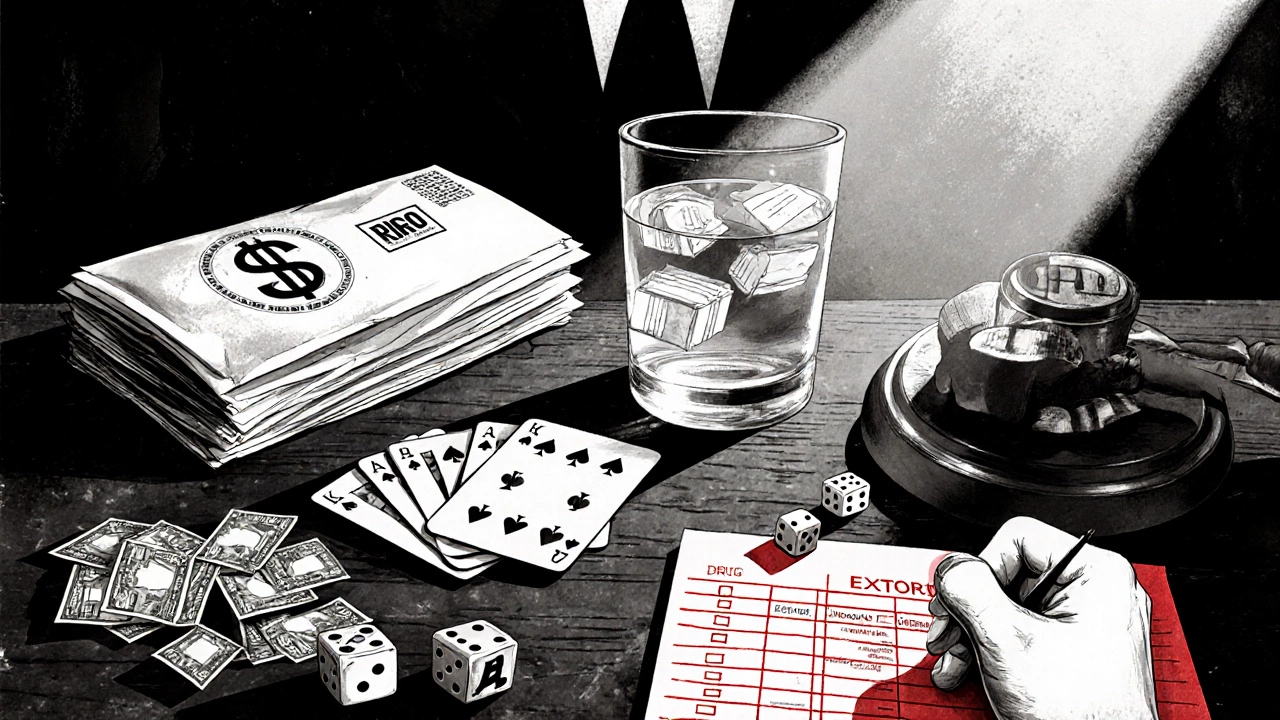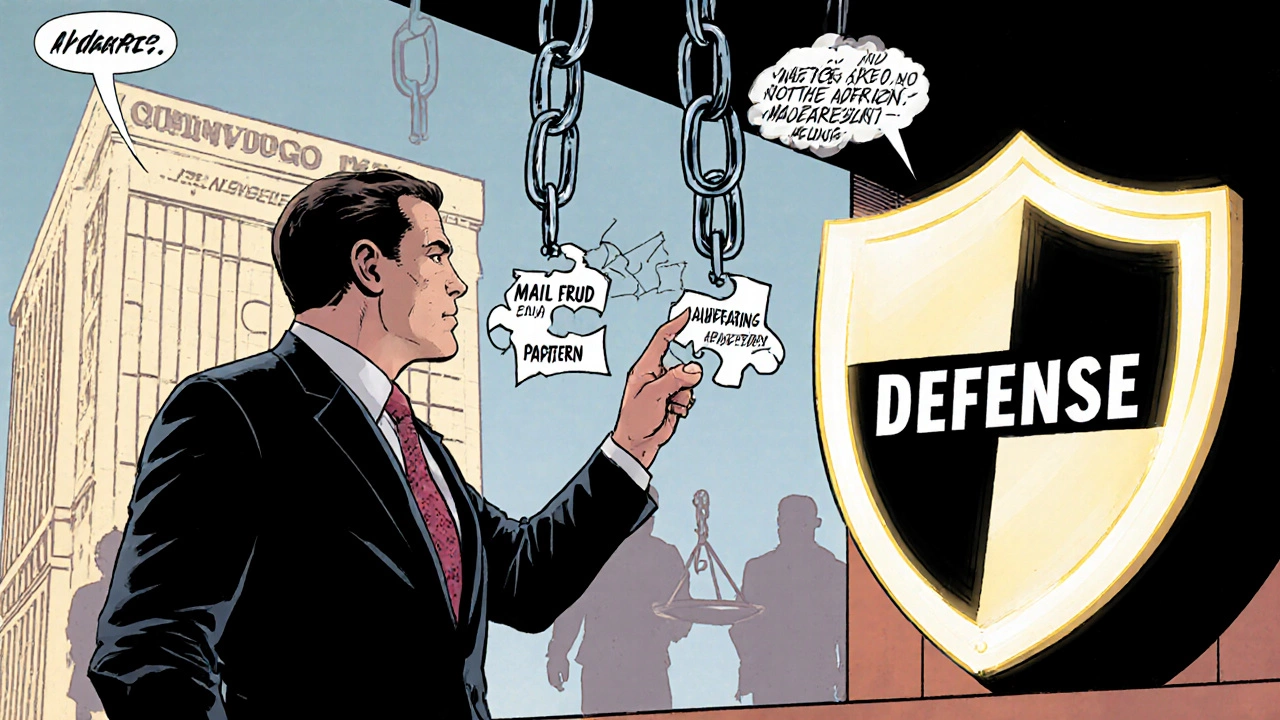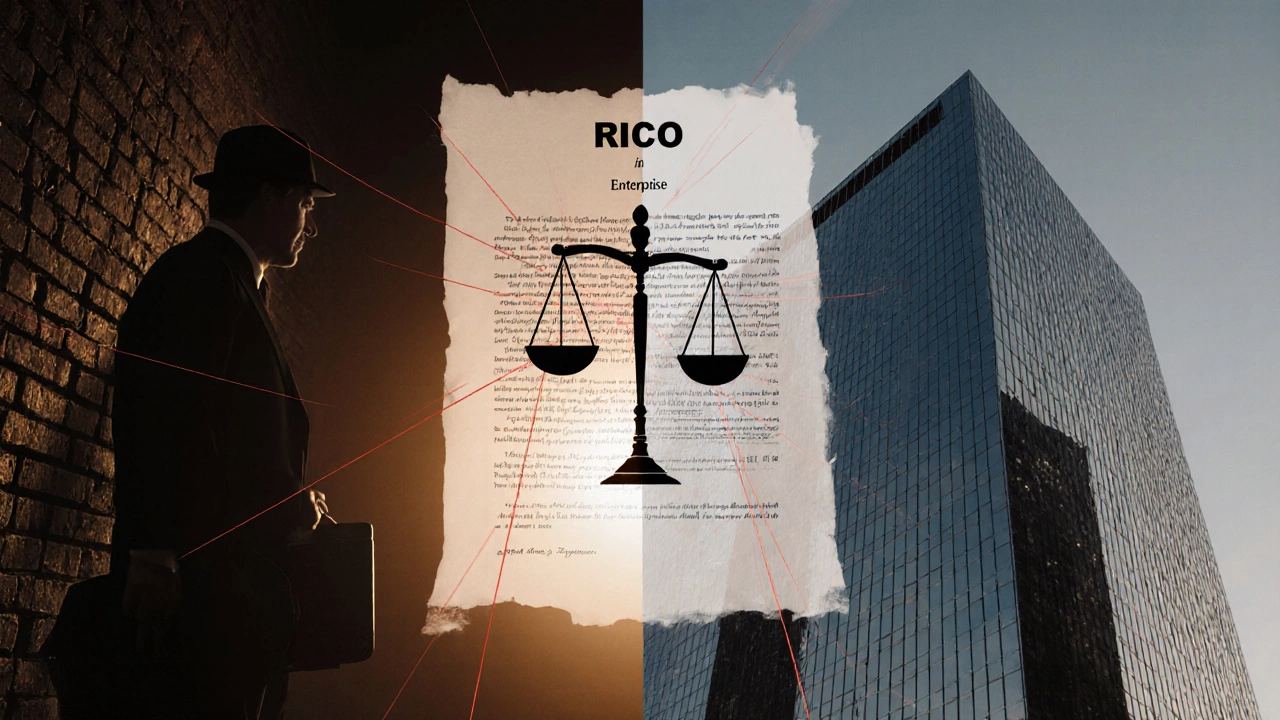RICO Charge Elements Checker
An enterprise is an organization, either formal or informal, involved in racketeering activities.
A pattern requires at least two related predicate offenses within a 10-year period.
Select a predicate offense from the list below:
Enter your selections and click "Check RICO Elements" to analyze if all three components are present.
Key Takeaways
- A RICO charge stems from the federal Racketeer Influenced and Corrupt Organizations Act, targeting patterns of illegal activity within an enterprise.
- To prosecute, the government must prove three elements: a criminal act, an ongoing enterprise, and a pattern of at least two related offenses.
- Penalties can reach 20 years per racketeering count, hefty fines, and forfeiture of assets.
- Common predicates include mail fraud, money laundering, drug trafficking, and illegal gambling.
- Defenses often focus on breaking the "pattern" requirement, showing lack of an enterprise, or challenging the factual basis of each predicate.
When you first hear the term RICO is a federal law - the Racketeer Influenced and Corrupt Organizations Act - that targets organized crime and corrupt business practices. Enacted in 1970, it was designed to go after the Mafia, but today it reaches everything from street gangs to multinational corporations. If you or someone you know is facing a RICO charge, you’re probably wondering what that actually means, how severe the consequences can be, and whether there’s any way to fight it. Let’s break it down in plain language.
What Exactly Is a RICO Charge?
At its core, a RICO charge accuses a person or entity of participating in an "enterprise" that conducts a "pattern of racketeering activity". In legal‑speak, the act has three moving parts:
- Enterprise - a formal organization (like a corporation) or an informal association (a gang, a group of conspirators).
- Pattern - at least two related racketeering acts within a 10‑year window.
- Racketeering activity - a list of 35 federal crimes ranging from fraud to murder.
All three elements must line up for the government to secure a conviction. If any one is missing, the RICO charge falls apart.
Core Elements of a RICO Violation
Let’s unpack those three pieces with a bit more detail.
- Enterprise can be a legal entity like a corporation, a partnership, or an informal group such as a street gang. The courts look at shared goals, ongoing relationships, and coordinated actions.
- Pattern means the illegal acts aren’t isolated. Prosecutors must show at least two predicate offenses that are related in purpose, method, or results.
- Racketeering activity includes crimes like mail fraud, interstate transportation of stolen goods, drug trafficking, bribery, and even murder‑for‑hire.
Think of it like a puzzle: each racketeering act is a piece, the enterprise is the board, and the pattern is the picture you see when the pieces fit together.

Common Predicate Offenses and How They Compare
While RICO can attach to many crimes, a handful show up repeatedly in cases. Below is a quick side‑by‑side look at the most frequent predicates versus similar statutes.
| Predicate | Typical RICO Use | Related Federal Statute | Key Difference |
|---|---|---|---|
| Mail Fraud (18 U.S.C. § 1341) | Sending fraudulent communications to support a scheme | Mail Fraud Act alone | RICO adds enterprise & pattern requirements, increasing penalties. |
| Money Laundering (18 U.S.C. § 1956) | Processing illicit proceeds through a business network | Bank Secrecy Act | RICO ties laundering to a broader criminal organization. |
| Drug Trafficking (21 U.S.C. §§ 841‑846) | Managing a drug distribution network | Controlled Substances Act | RICO focuses on the organized‑crime aspect, not just the drug offense. |
| Extortion (18 U.S.C. § 1951) | Using threats to extract money or services for the enterprise | Hobbs Act | RICO allows simultaneous prosecution with other predicates. |
| Gambling Offenses (18 U.S.C. § 1955) | Operating illegal gambling rings | Illegal Gambling Business Act | RICO combines gambling with other racketeering acts for harsher sentences. |
Penalties and Sentencing Guidelines
RICO is notorious for its stiff consequences. Here’s what a conviction can look like:
- Prison time: Up to 20 years for each racketeering count, and potentially life if the predicate is a violent crime.
- Fines: Up to $250,000 for individuals, twice that for corporations, plus restitution to victims.
- Asset forfeiture: The government can seize property linked to the illegal enterprise, even if the defendant wasn’t directly convicted of owning that property.
- Civil component: Victims can sue under the civil RICO provision for triple damages (treble damages) and attorney fees.
Sentencing guidelines also consider the number of predicates, the defendant’s role in the enterprise, and the total financial loss caused. A low‑level courier might face a few years, whereas a mastermind could see decades and a lifetime of asset loss.
Real‑World Example: The 2024 ‘MetroMob’ Case
In early 2024, a nationwide ride‑share company, MetroMob, was hit with a RICO indictment. Prosecutors alleged that the company’s executives used a shell corporation to launder money from a parallel illegal gambling operation. The indictment listed eight predicate offenses, including mail fraud, money laundering, and illegal gambling.
The case illustrates two key points:
- Enterprise can be a legitimate business: Even a publicly traded firm can qualify if it’s being used as a front for illicit activity.
- Pattern can span diverse crimes: Prosecutors don’t need the predicates to be the same crime; they just need a common thread linking them to the enterprise.
After a three‑month trial, the court convicted two top executives on four RICO counts, handing down 15‑year sentences and ordering forfeiture of $12million in assets. The civil RICO suits filed by investors are still pending, seeking $45million in treble damages.

Defenses and Ways to Fight a RICO Charge
Facing a RICO charge can feel overwhelming, but there are several strategic angles defense attorneys often pursue:
- Breaking the pattern: Show that the alleged predicate acts are unrelated or occurred more than ten years apart, which defeats the "pattern" element.
- Absence of an enterprise: Argue that there was no organized group, just isolated individuals acting on their own.
- Insufficient predicate proof: Challenge the evidence for each underlying crime - if one predicate fails, the whole RICO case collapses.
- Statute of limitations: RICO has a 10‑year limit for the pattern; any older acts can’t be counted.
- Entrapment or government overreach: Demonstrate that law‑enforcement induced the alleged illegal conduct.
Successful defenses often combine several of these tactics, tailoring the approach to the specific facts of the case.
Interaction with State Laws and Civil RICO Actions
RICO is a federal statute, but many states have adopted their own “RICO‑style” laws (e.g., New York Penal Law §70.10). While state RICO statutes mirror the federal elements, they usually carry lower maximum penalties and can be used alongside federal charges.
On the civil side, a plaintiff can file a RICO lawsuit even without a criminal conviction. The burden of proof is lower - a preponderance of the evidence rather than beyond a reasonable doubt. Successful civil RICO cases often result in hefty monetary awards, especially when the defendant’s assets are still reachable.
Frequently Asked Questions
What does RICO stand for?
RICO is the abbreviation for the Racketeer Influenced and Corrupt Organizations Act, a federal law passed in 1970 to combat organized crime.
How many crimes must be proven for a RICO pattern?
At least two related predicate offenses within a ten‑year period are required to establish a pattern.
Can a single individual be charged under RICO?
Yes. Even a solitary actor can be prosecuted if they conduct two or more predicate crimes as part of an enterprise, which may be a formal business or an informal group.
What are the typical penalties for a RICO conviction?
Each racketeering count can carry up to 20 years in prison, fines up to $250,000 (or double for corporations), and forfeiture of assets tied to the illegal activity.
Is there a civil remedy for victims of RICO violations?
Yes. Victims can file a civil RICO suit to recover three times their actual losses, plus attorney fees, even if the government never brings a criminal case.
Understanding a RICO charge means grasping the three‑part puzzle of enterprise, pattern, and predicate crimes. Whether you’re a business executive, a small‑time dealer, or simply a curious citizen, knowing the building blocks, potential penalties, and defense routes can make a huge difference if you ever find yourself in the crosshairs of this powerful statute.
